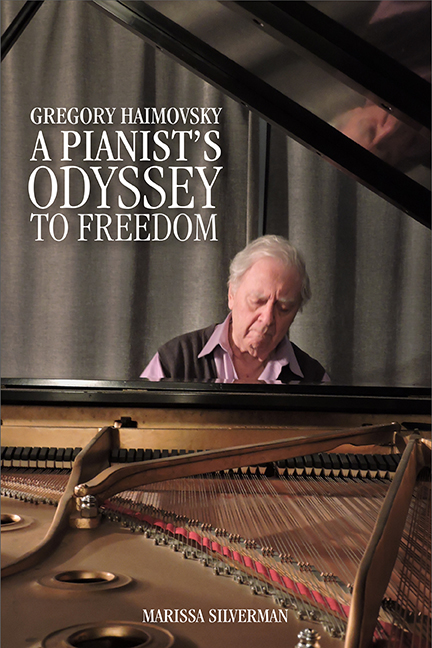Book contents
- Frontmatter
- Dedication
- Contents
- Acknowledgments
- Introduction
- 1 A Pianist Is Born
- 2 A Concert Pianist in Exile
- 3 Spirituality, Love, and Color: Understanding Messiaen’s Music
- 4 From Thaw to Frost: Neonationalism and the Messiaen Premieres in the USSR
- 5 Haimovsky and Grazhdanstvennost’
- Appendix 1 Selected Performances of the Music of Olivier Messiaen by Gregory Haimovsky, 1964–72
- Appendix 2 Selected Writing by Gregory Haimovsky on the Music of Olivier Messiaen
- Notes
- Index
5 - Haimovsky and Grazhdanstvennost’
Published online by Cambridge University Press: 04 June 2021
- Frontmatter
- Dedication
- Contents
- Acknowledgments
- Introduction
- 1 A Pianist Is Born
- 2 A Concert Pianist in Exile
- 3 Spirituality, Love, and Color: Understanding Messiaen’s Music
- 4 From Thaw to Frost: Neonationalism and the Messiaen Premieres in the USSR
- 5 Haimovsky and Grazhdanstvennost’
- Appendix 1 Selected Performances of the Music of Olivier Messiaen by Gregory Haimovsky, 1964–72
- Appendix 2 Selected Writing by Gregory Haimovsky on the Music of Olivier Messiaen
- Notes
- Index
Summary
He was wholly on the side of freedom,
He was wholly on the side of light!
—Aleksandr Blok, “I want to live”What was Haimovsky’s mission? Was he only concerned with being an “artist for himself”—performing for public recognition, self-satisfaction, and selfpreservation? Or was he primarily concerned with “musical beauty for its own sake”? Haimovsky’s answer is a resounding “beauty for its own sake!”
Although it is not my place to dispute his personal viewpoint, I believe (as I have told him) that his answer omits to credit a fundamental dimension of his personhood and artistry. For as I think back now to March 21, 1993— when I was sitting in row K, seat 110, of Merkin Concert Hall in New York City, watching and listening to him perform Messiaen’s works—and consider everything I have learned about and from him during the last twentyfive years, it strikes me that he does not fully appreciate the degree to which he courageously resisted and succeeded in challenging the oppressions and brutalities of the USSR by “putting his artistry to work” for artistic and social transformations. As I have argued throughout this book, by means of his performing and writing he fought all Soviet “isms”: Stalinism, nationalism, and the distortions of Socialist Realism. He persevered in finding ways to publically embody and communicate an alternate way of being, as expressed in and through Messiaen’s oeuvre: a life of universalism, faith, and joy.
I believe Haimovsky’s steady moral compass, his commitment to “beauty for its own sake,” and his embrace of Messiaen’s ideals of eternity and love represent the most important traits of grazhdanstvennost’: selflessness, selfsacrifice, courage, conscientiousness, integrity, truthfulness, and a devotion to positive self- and community transformation.
In the aftermath of Haimovsky’s experiences in the Soviet Union, it is remarkable that he ultimately found his way to a position as an associate professor of piano at the (then) Rubin Academy of Music in Jerusalem and, later, as chair of piano at New York University. In the West, he has continued to advocate for his artistic and social beliefs by concertizing throughout the world, teaching at NYU, founding and directing the NYU Chamber Music Society, making a number of recordings, and publishing many books.
- Type
- Chapter
- Information
- Gregory HaimovskyA Pianist's Odyssey to Freedom, pp. 136 - 164Publisher: Boydell & BrewerPrint publication year: 2018



